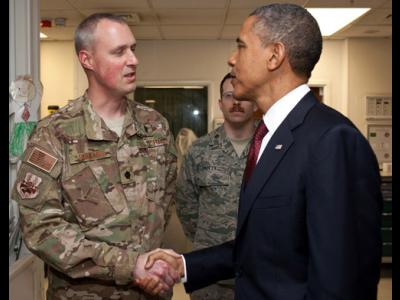Ministry among the Troops in Afghanistan

Chaplain Brian Bohlman greets President Barack Obama during a surprise visit by the president to Afghanistan. The president told Bohlman, "Thank you, Chaplain, for what you do here. You are part of the healing team." (White House photo)
Lt. Col. Brian Bohlman, a U.S. Air Force chaplain, graduated from Columbia International University in 2000 with a Master of Divinity degree. Today, he finds himself in one of the world’s hotspots – Afghanistan. As a military chaplain Bohlman is what CIU Chaplaincy Professor Michael Langston calls “the bearer of the presence of God – the physical reminder that God is always with us.” From Afghanistan, Bohlman talked about his work in an email conversation.
Describe your responsibilities.
I have been deployed since March 2012 from my Air National Guard unit in Eastover, S.C. and serving at Craig Joint Theater Hospital, Bagram Airfield, Afghanistan. As the senior hospital chaplain at the only trauma center in Afghanistan, I oversee and deliver pastoral care to 528 Joint Medical Staff who provide urgent health care to U.S. and Coalition Forces, Afghan National Security Forces, contractors, and local nationals.
What is the relationship between those you minister to and the chaplain? How do they view you?
My primary mission is to offer spiritual care to every wounded warrior who comes through our facility. In most cases, patients usually stay here for 24-48 hours before being transported to Landstuhl Regional Medical Center in Germany. I am viewed by the medical staff and wounded warriors as the one who cares for their soul or their spiritual health and emotional well-being.
Do they trust you? Why do they come to you? Do you seek them out?
As a chaplain, my ministry philosophy involves building relationships with the people I serve alongside so that I can offer pastoral care and counseling to them when they go through a difficult time or crisis. In a matter of days after my arrival, I found myself counseling staff about how to better care for themselves after being exposed to injuries of severely wounded service members. Caring for the caregiver is crucial in a hospital setting – especially when located within a combat zone – and that is why I have several confidants back home to help me process what am I experiencing over here.
Are many of those you minister to "churched?" What is their view of God?
I have met hundreds of patients from a variety of religious faiths groups and denominations as well as a few atheists and agnostics. Many ask me to pray for them, their families, and especially the members of their unit that they left behind. Regardless of their faith or beliefs, I take time to listen to their personal stories of grief and pain and always thank them for the sacrifices they’ve made for the freedom of others as well as comfort those of Christian faith with Scripture, usually from the Psalms. My ministry model resembles that of Christ as he walked on the road to Emmaus with two grief-stricken men, asked them questions, took time to listen to their pain, and offered comfort from the Scriptures, and then disappeared from their sight (Luke 24). I may never again see the wounded warriors that I meet in this trauma hospital, but I will always remember them and treasure the opportunity to provide them with a ministry of presence, care, and hope.
How did your CIU experience help you in the position you find yourself in today?
I have used the skills acquired in the various crisis counseling classes taken at CIU. I have also developed a relationship with CIU Professor of Chaplaincy Ministries and retired Navy Chaplain, Dr. Mike Langston. I hope to use my deployment experience to help CIU students in the new Master of Divinity chaplaincy track as they prepare to serve in the military as chaplains.
For more on the CIU Chaplaincy Program visit: /graduate/master-divinity/chaplaincy.

